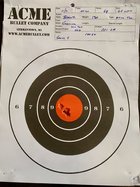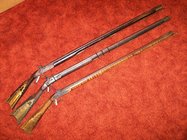Well, not really spiritual for me, but it is good therapy....
robo hippy
robo hippy
I was target shooting with my son the other day, and while I was doing that, I was thinking about "spiritual turning" and how similar it is to precision trigger control.Spiritual turning doesn't have to produce a good product. It's the state of mind you're in when turning or doing anything. Spiritual turning can free you up, loosen your tightness and calm your mind. The process becomes enjoyable and the product takes care of itself.

What is the fun at 25 yards. I prefer 100 with my Mosin Nagant. Not a precise group but can do 4 inch so far. Maybe better later with more practice this fallI was target shooting with my son the other day, and while I was doing that, I was thinking about "spiritual turning" and how similar it is to precision trigger control.
I don't reload for ultimate accuracy, like some precision target shooters do, but I do have a Russian Ishmash Biathalon toggle action precision target rifle that is capable of one hole 5-shot groups at 25yds....this, by using appropriate match grade standard velocity 22LR ammunition. At one time, about 20yrs ago, I competed with this rifle in an online match.
View attachment 47594
-----odie-----
What is the fun at 25 yards. I prefer 100 with my Mosin Nagant. Not a precise group but can do 4 inch so far. Maybe better later with more practice this fall

At the end of the day, it's hard to describe precisely what "it" is.
Monty,Interesting thread. Not sure if "spiritual" is exactly the right word from my viewpoint, if there is a single perfect word for it. Woodturning is not going to save your soul although it surely can salve some of life's bumps and bruises if you let it. In this group it might well be religious in nature.
It's not a vapid superficial faux-swooning at seeing a couple swirls of paint on a canvas leaving the viewer a quivering mass of flesh on the floor pondering the vociferous cry of the artist's immortal soul. If that's what we are talking about, I'm out of here so fast it will make your head spin.
It's not a just technical mastery of man vs nature, man vs machine, or a purely practical application to produce parts. But developing those technical skills are a big part of what we do.
I see it as more of a connection or a grounding. A connection to earth, forest, and people from different walks of life who share a commonality. A connection to the past and in a way sort of a bridge to the future. A bridge to the future for those that view the work we leave behind and more importantly those we teach. What makes that connection? As others have said, attention to detail, focus, in the zone, therapy are all part and parcel of the whole. People make this possible. People that made the lathe, people that made M42 steel, people that cut down the tree, people that transport the tree...etc.
Life here in the USA has become undeniably more stressful in the last decade(s), greater and growing divisions in society, fighting for the almighty dollar, loss of civility, combined with a lack of strong leadership. More and more it has become "me" instead of "us". Grounding ourselves in an immersive activity like woodturning helps to ease some of those stresses and perhaps offers us a different perspective. I know that my stress flows out of my gouge and into the shavings then falls to the floor. All of my worries cease for a time and that is more valuable to me than gold.
The comparison to precision match shooting is a very valid one. As a past Texas state champion archer and shooting sports competitor many of the very same skills and attributes are present. The most important connection between the two is probably consistency. Consistency is only developed over time and requires long hours of practice. So much practice that doing one or the other could be called a "practice" itself. I still need a lot of practice at the lathe. I learn something new every time I stand in front of it. When the learning stops, so will the practice. In the meantime, it's the journey that's most important of all.
View attachment 47596
At the end of the day, it's hard to describe precisely what "it" is.
Are we searching for accolades, awards, or rewards? OR do we seek education and instructions?An interesting post touching on 'the difficult to define' area that exists in all crafts. Back in the day apprenticeships where long compared to day, ie when I grew up a plumbing apprenticeship was 7years.
But apart from what any apprentice is taught there is another area of 'impartation' something a master does/gives to his pupils .
In the Greek the word is 'metadidomi' to give over, to share something more than the basics or mechanics of the craft. Its still around today but its been blurred by the volume of information and the speed of which it comes. As it comes from a certain relationship between the master and the apprentice. If it exists where does it exist now? In the west the speed of life almost universally pushes it away and makes it elusive, hard to find and many find it to hard to pursue. Places like Japan, Korea in Asia have it in the various crafts but it has to be sort out even there there are influences blurring lines.
Will it be lost eventually? I dont think so we see crafts being lost then found and revitalise again, martial arts would be a good example.
impartation implies education and instruction. The rewards, awards are the blurring of the lines something we are good at in the westAre we searching for accolades, awards, or rewards? OR do we seek education and instructions?
Are we searching for accolades, awards, or rewards? OR do we seek education and instructions?
impartation implies education and instruction. The rewards, awards are the blurring of the lines something we are good at in the west
One of the disadvantages of living in these times, is the great plethora of tools, equipment, and advice available to those who want to learn. Some see the opposite, but IMHO, it all tends to confuse. The answer to the confusion isn't more and more new tools and advice, but to take what you have and apply some perseverance, mixed with a liberal dose of solitude, practice, and contemplation. Progress is slower this way, but the spiritual knowledge gained is compounded.
Yes.Very interesting perspectives. When I put a piece in the lathe, with few exceptions, I have a general idea as to what I want to make. Once I start, that idea might change once the wood starts “talking” or I make a mistake. The only measurement I take is how close am I to blowing through a piece. Everything else is what is pleasing to my eye. I’m still working towards the perfect piece and doubt I will ever make it. But, I will keep trying.
I can see all sides to this discussion. Wether it is a spiritual connection to wood, being in the zone or just really, really enjoying what we do, I’ll take it.
A friend of mine wanted to watch me turn a piece. He brought his wife who is Chinese and speaks very little English. When I finished a small hollow form with nice grain she said “I see picture.” I told my friend she gets it! I asked him to ask her to write down her name in Chinese on a pad which she did. I signed the bottom to her using Chinese writing. When I handed to her, I was overwhelmed with her gratitude. Money can’t buy that. It can’t buy the spiritual either.
I fully agree with you, Jerry. But oh, what a long time and amount of money it took me to agree with your statement. I now strive to be a very proficient user of four or five tools instead of a mediocre user of many of specialty tools. I have a supply of tools that had a lot of promise but no follow through that are now just collecting dust.I suspect spirituality is more connected to what you place on the table, play through the speakers, project on the screen or hang on the wall. I have been moved by all at one time or another. Never by the tools or process.
Well Odie I cannot agree with your term but will add that turning is both elevating in an exciting way and very calming . It is exciting just seeing what will come off the lathe, No I do not plan each turning. It is calming because it takes my mind off all other things in the world by both concentrating and enjoying what is on the lathe,
My great great great great grandfather Andrew Kopp, and his son, my great great great uncle George, made Pennsylvania long rifles, Andrew from around 1820 to 1860 and George, from 1830 to 1870.One of my great,great, great grandfather's was a gun smith, making long rifles during the time of the revolutionary war. Very few of the long rifles he made still exist. I have this strange feeling that if I were to be permitted to just touch something he made, it would strengthen my connection to him.

Actually this makes more sense than what I posted.My great great great great grandfather Andrew Kopp, and his son, my great great great uncle George, made Pennsylvania long rifles, Andrew from around 1820 to 1860 and George, from 1830 to 1870.
Our family was fortunate to collect five of these over the years. To hold these exquisite pieces of art in your hands, and know it was made by a direct ancestor, is an indescribable feel.
View attachment 61229
I’m fortunate that I’ve only been turning a year and a half, so I’m just a hobbyist. I don’t try to sell stuff, but I’m starting to get some commissions by word of mouth.
So I still know who the recipient of each piece I make is, a friend or family member or an acquaintance of one of them.
So not to sound hokey or anything, but I literally pray while I’m turning, that the piece is as beautiful and functional as possible, for the honor and glory of God, and that He helps me make the piece well, so it blesses the recipient, a fellow child of God. When I remember to do this, the piece always has a special character to it that is often lacking when I’m just experimenting with a new technique.
Maybe this isn’t what was meant by “spiritual turning” in the initial post, but it is for me.
Maybe this isn’t what was meant by “spiritual turning” in the initial post, but it is for me.
